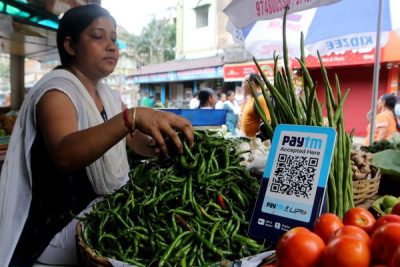Emerging economic should look to boost drive economic advancement by harnessing the digital revolution that's empowering MSMEs to leapfrog financial hurdles and secure their future.
Author: Sauradeep Bag, Observer Research Foundation
Micro-, small- and medium-sized enterprises (MSMEs) are the backbone of emerging economies — fuelling entrepreneurship, generating employment and driving economic growth with modest capital investments. While the lack of access to financial resources has continued to hinder the prosperity of these businesses, advancements in digital public infrastructure, such as India’s Open Credit Enablement Network (OCEN), offer hope for MSMEs seeking finance.

MSMEs have historically played a crucial role in the advancement of emerging economies by driving innovation and economic expansion. In India, they account for more than 29 per cent of GDP and are responsible for half of the country’s total exports. They also contribute to one-third of India’s manufacturing output, providing employment to over 110 million individuals, with the goal of increasing this number to 150 million in the near future.
There are currently 64.2 million MSMEs in Indonesia, making up 61 per cent of the country’s GDP. These enterprises employ a vast portion of the country’s workforce, with approximately 97 per cent (119.6 million) employed within the MSME sector. Yet only about 17.5 million MSMEs in Indonesia have transitioned to the digital realm and leveraged e-commerce opportunities.
Closing the gap in access to financing is imperative to unlock the true potential of MSMEs in emerging economies. Financing plays a pivotal role in the growth and sustainability of MSMEs, but they are typically excluded from mainstream credit channels. Traditional financial institutions, such as banks and non-banking financial companies, often grapple with high operating costs that render it unfeasible to cater to borrowers with smaller loan requirements. MSMEs are compelled to turn to informal moneylenders and costly microfinance institutions.
Recent advancements in India’s digital public infrastructure offer a glimmer of hope for MSMEs seeking credit. Digital public infrastructure is the digital foundation that enables various technology-driven solutions to flourish. India’s experience with digital public infrastructure, exemplified by India Stack, provides valuable insights and digital solutions that can benefit countries worldwide, especially those grappling with similar challenges in internet accessibility and digital literacy.
OCEN stands as a transformative force in India’s financial landscape, offering a potential solution for MSMEs. OCEN aims to address the estimated Rs 2–2.5 million crore (US$350 billion) credit gap in the Indian MSME sector by enabling remote lenders to operate in distant regions and offering short tenures and small-ticket loans. OCEN is intricately woven into India Stack’s open application programming interface.
OCEN has democratised access to affordable credit, positioning itself as a beacon of financial inclusion. This innovation simplifies access to credit and embraces the principles of embedded finance. It acts as a universal language, connecting lenders and mediators to craft scalable financial products.
Non-financial service providers, especially loan service providers, are empowered to create the foundational elements of a credit cycle. Loan service providers act as digital agents for borrowers, ensuring their interests by providing access to cost-effective credit. By simplifying the lending process, OCEN makes financial products more appealing to both borrowers and lenders, furthering the cause of economic growth and prosperity for all.
OCEN reimagines the lending value chain, allowing non-financial service providers to transform into fintech-enabled marketplaces. For instance, a logistics company can seamlessly offer loan products to MSMEs within its platform, obviating the need for MSMEs to venture outside the logistics ecosystem to secure credit.
This innovative framework, empowered by digital public infrastructure, has a ripple effect across various industries, from logistics and neo-banks to payment gateways and agritech platforms. Entities across these industries can harness OCEN to become loan service providers. These loan service providers bridge the gap between lenders and borrowers, empowering lenders to offer more appealing financial products while reducing their operational costs.
OCEN’s impact need not be limited to India alone — it can potentially reshape the financial ecosystems of developing nations worldwide, setting the stage for a more inclusive and prosperous global economy. As member of the G20, India envisions itself as a catalyst for global change, offering OCEN as a guiding light for other developing nations seeking to elevate their MSMEs to new heights. Emerging economies often share similar characteristics, including internet penetration, smartphone ownership and the substantial contribution of their MSME sectors to their economies. OCEN, coupled with digital public infrastructure, can offer a transformative solution for these nations.
The G20 Leaders’ Declaration in New Delhi underscores the importance of committing to fostering the responsible, sustainable and inclusive utilisation of digital technology by MSMEs. While the declaration does not mention the OCEN, perhaps due to its early stage of development, there is precedent for India exporting fintech innovations. In India, the UPI payments system has gained immense popularity for retail digital payments and its adoption is rapidly spreading worldwide. France, the United Arab Emirates and Singapore have collaborated with India on emerging fintech and payment solutions. Through the strategic use of digital public infrastructure, nations can similarly embark on a journey of equitable access to credit, financial inclusion and economic prosperity.
OCEN has the potential to be a global game-changer, offering MSMEs in emerging economies the credit access they deserve. These economies must acknowledge the role of MSMEs in driving economic growth and commit to removing obstacles to their prosperity. Digital public infrastructure and the determination of nations to empower their MSMEs can lay the foundation for a more inclusive, equitable, and prosperous global economy.
Sauradeep Bag is Associate Fellow in FinTech at the Observer Research Foundation.
The post Leveraging technology to support enterprises in emerging economies first appeared on East Asia Forum.


